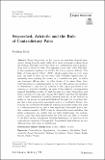Swyneshed, Aristotle and the Rule of Contradictory Pairs
Abstract
Roger Swyneshed, in his treatise on insolubles (logical paradoxes), dating from the early 1330s, drew three notorious corollaries from his solution. The third states that there is a contradictory pair of propositions both of which are false. This appears to contradict what Whitaker, in his iconoclastic reading of Aristotle’s De Interpretatione, dubbed “The Rule of Contradictory Pairs” (RCP), which requires that in every such pair, one must be true and the other false. Whitaker argued that, immediately after defining the notion of a contradictory pair, in which one statement affirms what the other denies of the same thing, Aristotle himself gave counterexamples to the rule. This gives some credence to Swyneshed’s claim that his solution to the logical paradoxes is not contrary to Aristotle’s teaching, as many of Swyneshed’s contemporaries claimed. Insolubles are false, he said, because they falsify themselves; and their contradictories are false because they falsely deny that the insoluble itself is false. Swyneshed’s solution depends crucially on the revision he makes to the acount of truth and falsehood, brought out in his first thesis: that a false proposition can signify as it is, or as Paul of Venice, who took up and developed Swyneshed’s solution some sixty years later, puts it, a false proposition can have a true significate. Swyneshed gave a further counterexample to (RCP) when he claimed that some insolubles, like future contingents, are neither true nor false. Dialetheism, the contemporary claim that some propositions are both true and false, is wedded to the Rule, and in consequence divorces denial from the assertion of the contradictory negation. Consequently, Swyneshed’s logical heresy is very different from that found in dialetheism.
Citation
Read , S L 2020 , ' Swyneshed, Aristotle and the Rule of Contradictory Pairs ' , Logica Universalis , vol. 14 , no. 1 , pp. 27-50 . https://doi.org/10.1007/s11787-020-00246-1
Publication
Logica Universalis
Status
Peer reviewed
ISSN
1661-8297Type
Journal article
Collections
Items in the St Andrews Research Repository are protected by copyright, with all rights reserved, unless otherwise indicated.

